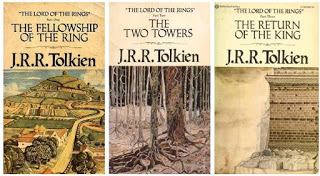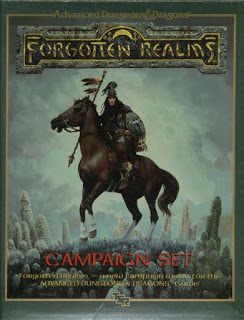There is something of a conversation going around certain corners of the OSRisphere about settings. Are they needed? Are they a good thing? Is there value in someone else’s setting when you’re doing your own? And so forth. Most of this discussion seems to have been inspired by a quasi-review of the RPGPundit’s excellent Dark Albion book.
I was particularly struck by two comments in all the brou-ha-ha; “You don’t need a campaign setting to play D&D“, and “Rpg settings solve a problem I don’t have“, both not-so-coincidentally by Jeffro Johnson, whose original post about Dark Albion seems to have been the genesis of the current discussion.
There’s little to disagree with in the first comment, on its face. Of course it’s not necessary to have a campaign setting to play the game. Conventions are stuffed with one-shot games, the earliest published modules were pretty much stand-alone (with perfunctory mentions of outside events and places that had little to no impact on the actual adventure), and it can be argued that the first few Castle Greyhawk games that were played, that formed the genesis of the game as we know it, were set in a vacuum; the City of Greyhawk and broader World came later.
That said, even the most rudimentary dungeon crawl assumes a world. I’ve written about the implied setting that is baked into the rules. Doesn’t matter if the DM hasn’t detailed the leaders of the thieves’ guild, the gods of the clerics, or the stats of the Grand Druid. They’re out there somewhere.
And on a practical level, while it is certainly possible to play the game without a coherent campaign setting, outside of conventions and one-shots, nobody plays it that way. Whether they use a published setting, such as the World of Greyhawk or the Forgotten Realms (or Dark Albion), or the DM has gone to the trouble of creating a new and unique campaign world, that’s the way the vast majority of players approach the game.
So, while it’s technically true, “you don’t need a campaign setting to play D&D” is neither relevant nor helpful to the discussion. Indeed, in the context of the larger discussion, it seems a rather petulant attempt to knock Dark Albion, once it was pointed out that it is not a complete rule set so much as a setting with specific rule variations.
The second quote is actually the more interesting of the two, implying, as it does, that when a DM creates a setting, no other input is required (or welcome). Speaking as a DM who has used both published and homebrewed settings for going on forty years, I find that sentiment simply untenable (not to mention hubristic in the extreme).
Setting aside for the moment the simple fact that any DM who has read any fantasy novels or stories written in the last seventy years is, to one degree or another, building on those settings (and if you think a fiction setting is any different from an RPG setting in anything other than the level of systematic detail presented, you’re deluded), the simple fact of the matter is that no one, no matter how clever, inventive, or well-read, can’t benefit from someone else’s ideas when it comes to devising or maintaining a campaign setting.
Especially in an environment such as D&D, and RPGs in general, where magpies are not only tolerated, but encouraged, taking bits and pieces from here and there is what we do as DMs. Do you honestly think there would be a Castle Greyhawk or Blackmoor without a Moria, or a Quarmall, or a Xuchotil? Pfft.
How many times have I found inspiration in someone else’s setting, and taken something (whole or in part) and used it in my own? More often by far, I don’t take things whole-cloth, but seeing what someone else has done in their own world sparks new ideas in my own mind, sending me down paths that I would never have gone otherwise. Just like a good fantasy novel.
So you don’t have a problem that RPG settings solve? You have the absolute perfect campaign, incapable of any improvement, a godlike work of creativity that flows unstilled and unsullied by any outside influences? You’re unique. And, I must say, I wouldn’t want to play in your game, because your campaign sounds pretty boring. Why would I want to play in a game limited by the imagination of a single person held in self-imposed isolation, when I can play in a game borne of the imagination of a person whose creativity is sparked and prodded and pushed down avenues that it would never have been otherwise, simply by virtue of reading what other people have done in similar (or entirely different) situations?
But again, that quote does seem more than a little bit petulant in context. Just knocking the idea of settings in general, when caught on a simple factual point that Dark Albion isn’t a rule set, but a setting with some rules. But hey, it did inspire my own imagination to start thinking about inspirations for posts, so it can’t be a completely bad thing.













Bravo! Truer words were never uttered. A good DM never stops delving for ideas and thus reads everything he can.
"So you don't have a problem that RPG settings solve?"
To me it's like "you don't need modules." "You don't need miniatures." "You don't need published materials." "You don't need books of other people's monsters." Etc.
If it doesn't solve a problem for you that doesn't mean it doesn't solve a problem for someone else. If you don't need it, that's great! If it doesn't work for you, no problem. That's a very different thing than meaning no one needs it, or that it doesn't work for anyone.
I read the comment as "I am too awesome for other people's settings."
Nice article! I love settings myself. I could see OSR enthusiasts wanting to encourage creating your own setting and minimalist backgrounds, but to me having an established setting helps stimulate my creativity.
-Havard